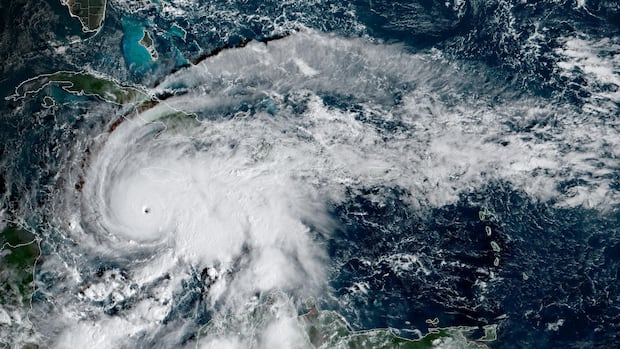Hurricane Melissa, one of the strongest ever recorded in the Caribbean, is set to hit Jamaica early on Tuesday after undergoing “rapid intensification” — a climate-charged phenomenon that’s increasingly sending devastating storms to the region.
On Saturday morning, Melissa was still just a tropical storm. But in under a day, the storm’s wind speeds increased from about 115 kilometres per hour to 225 kilometres per hour on Sunday.
By Monday morning, it had become a Category 5 hurricane, one of the fastest intensifications ever seen in the Caribbean.
By that afternoon, the winds had reached speeds of 281 kilometres per hour, according to the U.S. National Hurricane Center (NHC), making it the strongest storm on the planet so far in 2025.
Because it’s also moving very slowly, Melissa is “very, very dangerous,” said Akshay Deoras, a research scientist at the U.K.’s National Centre for Atmospheric Science at the University of Reading.
“If a tropical cyclone is moving slowly, then it means that whenever it will start dumping rain over Jamaica, it will give more chances for a lot of rainfall.”
The storm has already caused six deaths across the Caribbean, as Jamaica scrambles to prepare for what could be its worst-ever hurricane disaster. Some parts of the country could get a metre of rain, according to the NHC.
 Workers board up shop windows ahead of Melissa’s arrival in Kingston, Jamaica, on Sunday. (Matias Delacroix/The Associated Press)
Workers board up shop windows ahead of Melissa’s arrival in Kingston, Jamaica, on Sunday. (Matias Delacroix/The Associated Press)
Just last year, the southern part of the country was hit by Hurricane Beryl which caused losses of about $200 million US — 1.1 per cent of Jamaica’s entire GDP. Beryl also went through rapid intensification.
Deoras says two factors are fueling Melissa: The ocean surface temperature in the Caribbean is unusually high, about two to three degrees above normal, and tropical storms derive their energy from that top layer of water.
Melissa fed on those exceptionally warm conditions, allowing it to develop rapidly as it moved slowly through the region over the weekend.
Ocean heat is becoming more common across the world and influencing climate systems in new ways. A massive heatwave across the Pacific Ocean has caused unusual temperatures this fall in North America. Last year, global average sea surface temperatures were the warmest on record.
Shel Winkley, meteorologist at science non-profit Climate Central, says those hot ocean temperatures were made 500 to 700 times more likely because of climate change. The group’s analysis also suggests that climate change has strengthened Melissa’s top wind speed by about 16 km/h, increasing potential cost of its damages by 50 per cent.
Four of this season’s five hurricanes have undergone extreme rapid intensification, Winkley says.
“This is something that we didn’t see a couple decades ago, but that we’re now seeing at least every season, if not even multiple times this season.”

